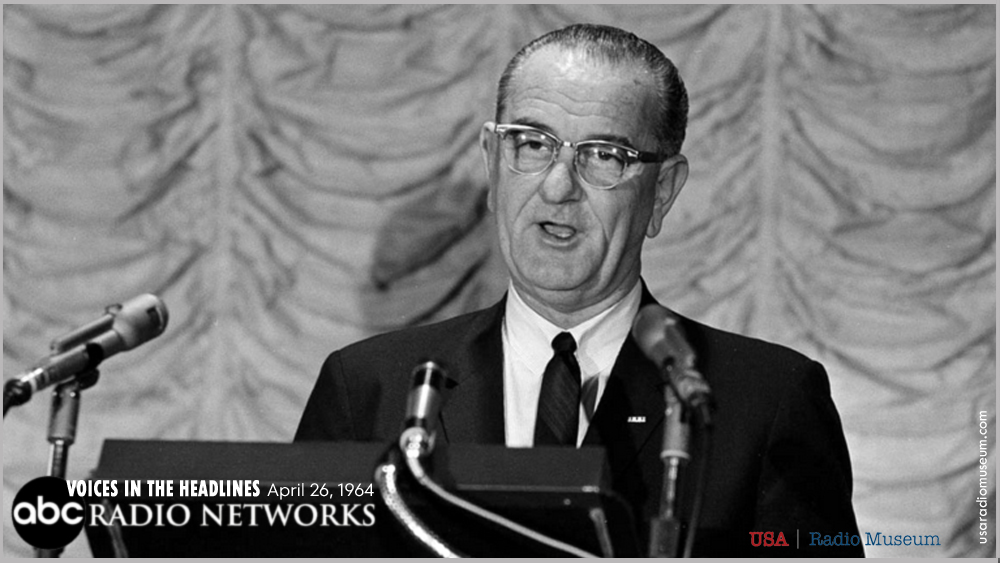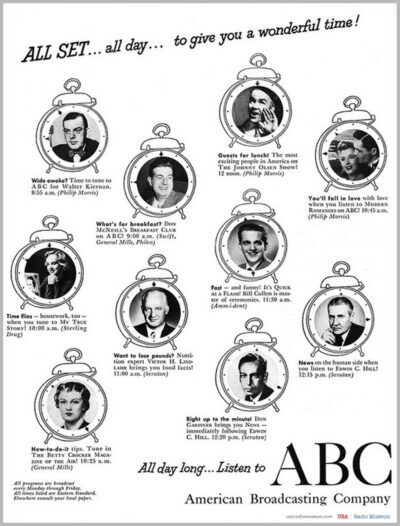ABC Radio Through the Decades: A Journey in Broadcasting Introduction Few institutions in American broadcasting have had the lasting imp
ABC Radio Through the Decades: A Journey in Broadcasting
Introduction
Few institutions in American broadcasting have had the lasting impact of ABC Radio. From its humble beginnings as the NBC Blue Network to its rise as a national news and entertainment powerhouse, ABC Radio has been a constant voice through some of the nation’s most defining moments. Over decades, it adapted to changing media landscapes, providing vital news coverage of wars, elections, cultural movements, and technological advancements. This journey—one of resilience, innovation, and reinvention—shaped the legacy of ABC Radio as a pillar of American broadcasting.
The Early Years (1927–1945): Birth of a Network
ABC Radio traces its roots to 1927, when NBC operated two distinct radio networks: NBC Red, which carried entertainment and high-budget programming, and NBC Blue, which focused on public service broadcasts, news, and cultural programming. However, in 1941, the Federal Communications Commission (FCC) ruled that RCA, NBC’s parent company, must sell one of its two networks to prevent monopolization. This led to the sale of NBC Blue to Edward J. Noble, the creator of Life Savers candy, for $8 million in 1943.
With ownership transferred, Noble rebranded the network as the American Broadcasting Company (ABC) in 1945. But ABC faced early challenges as it struggled to compete against giants like CBS and NBC, who had already established a strong foothold in broadcasting. The new network worked to define its identity and attract talent that could bring something fresh to the airwaves.
ABC Radio During World War II
Even before its official rebranding as ABC, the former NBC Blue Network had already played a crucial role in delivering wartime news. As World War II dominated headlines, Americans relied on radio broadcasts to stay informed. ABC covered key war updates, government briefings, and battlefield reports. This period was instrumental in cementing radio’s place as an essential news medium.
Notable War Correspondents
Some of the most distinguished war correspondents of the era contributed to ABC’s coverage:
- John MacVane – Reported on the Battle of Britain and the war efforts in Europe.
- Quentin Reynolds – Delivered vivid accounts of the war’s impact on soldiers and civilians.
- Ernie Pyle – Famous for his firsthand reports from the perspective of American troops.
- H.V. Kaltenborn – Offered commentary on global affairs and wartime developments.
These journalists helped ABC establish itself as a reliable source for war news, a reputation that would prove invaluable in the years to come.
Post-War Expansion (1945–1960s)
With World War II behind, ABC Radio sought to define its unique identity. Financial struggles made it difficult to compete against NBC and CBS, but the network innovated to carve out its place in radio history.
Major Moments in ABC Radio’s Growth
- Emphasis on Entertainment – ABC focused heavily on variety shows, serial dramas, and comedy programming, helping boost listener engagement.
- Investment in News – The network strengthened its news division, ensuring listeners received accurate and timely reports on domestic and international events.
- Entry into Television (1948) – ABC launched its television division, marking a turning point in its growth.
ABC gained momentum by embracing groundbreaking programming techniques. One example is Bing Crosby’s switch to ABC, where he was allowed to pre-record his radio show using audiotape, a revolutionary technology that gave performers more control over their content.
ABC’s Role in Defining News Coverage
During the 1960s, ABC Radio was front and center in reporting historic events, as it happened:
- The Assassination of President Kennedy (1963) – ABC affiliate WFAA-TV in Dallas was first to break the news, with station anchor Jay Watson interviewing eyewitnesses Bill and Gayle Newman and Abraham Zapruder.
- Vietnam War Reports – ABC correspondents stationed in Saigon provided firsthand battlefield updates throughout that period.
- Civil Rights Movement & MLK’s and RFK’s Assassination (1968) – ABC covered major civil rights protests, government decisions, and public reactions.
ABC Radio’s Coverage of the Apollo 11 Moon Landing (July 20, 1969)
As Apollo 11 made history on July 20, 1969, by landing astronauts Neil Armstrong and Buzz Aldrin on the Moon, ABC Radio played a critical role in broadcasting the event to the American public. Millions tuned in to hear the dramatic updates, analysis, and expert commentary as Armstrong prepared to step onto the lunar surface.
Key Moments in ABC’s Coverage
- Howard K. Smith, one of ABC’s most respected anchors, guided listeners through the historic mission, providing detailed reports on each phase of the Moon landing.
- Frank Reynolds also contributed, delivering breaking updates and introducing expert analysis on the scientific and political impact of Apollo 11.
- ABC assembled a panel of experts, including Bill Moyers, Marshall McLuhan, and Ian McHarg, to discuss the social significance of the mission and how space exploration would shape the future.
- As Armstrong prepared to take his “one giant leap for mankind,” ABC Radio provided real-time reporting, ensuring that audiences across the country experienced the emotion, anticipation, and triumph of the moment.
This monumental broadcast further cemented ABC Radio’s role as a leading voice in journalism, bringing live coverage of one of the most defining achievements in human history.
Prominent ABC Radio Journalists
- Paul Harvey – Famous for “The Rest of the Story,” blending news and storytelling.
- Edward P. Morgan – Known for insightful political analysis.
- Alex Dreier – A trusted journalist covering Cold War tensions, Vietnam, and social movements.
- Don Gardiner – A respected news anchor whose morning broadcasts and breaking bulletins made him a trusted voice in ABC’s news division.
Don Gardiner’s Legacy in ABC Radio News
- Breaking the News of JFK’s Assassination (1963) – Gardiner was one of the first radio anchors to report that shots had been fired at President John F. Kennedy’s motorcade in Dallas. His calm yet urgent delivery helped shape the early coverage of the tragedy.
- Morning News Anchor for ABC’s American Contemporary Network – From 1968 until his passing in 1977, Gardiner was the morning news voice for ABC’s American Contemporary Radio Network, delivering national and world news updates to millions of listeners.
- Versatile Broadcaster – Before his time as a news anchor, Gardiner was also an announcer for radio dramas, including Gangbusters and Dick Tracy, showcasing his range and adaptability in broadcasting.
- Respected Colleague – Gardiner was admired by fellow ABC staff announcers for his professionalism, precision, and ability to handle breaking news with clarity.
His contributions to ABC Radio News helped define the network’s commitment to timely and credible journalism, making him a key figure in radio history.
Gardiner’s impact stretched beyond breaking news—he was a morning news anchor for ABC’s American Contemporary Network, delivering essential reports to millions of listeners daily. His professional approach to handling live, breaking news set a standard for broadcast journalism.
A USARM Note: For this featured ABC Radio presentation, we present the network’s “Voices in the Headlines,” for the week of April-20-26, as broadcast over the ABC Radio Network, sixty-one years ago.
ABC Radio Network | Voices in the Headlines | April 26, 1964
Audio Digitally Remastered by USA Radio Museum | A Special Acknowledgement: This audio is sole property and courtesy of the Gordon Skene Collection. Mr. Gordon is owner and curator of the Past Daily website.
 The 1970s: Expansion & Influence
The 1970s: Expansion & Influence
The 1970s saw ABC Radio solidify its national reach. By this time, it had over 1,500 affiliates, becoming one of the largest radio networks in the country.
Key Moments in ABC’s Coverage
- Watergate Scandal (1972–1974) – ABC delivered comprehensive coverage of Nixon’s resignation.
- Energy Crisis & Economic Shifts – Reports focused on inflation, recession, and unemployment, during the Carter presidential years.
- Growth of Talk Radio & Music Formats – ABC News’ long-standing’s connection with their Top 40 radio affiliates also saw expansion with long-form talk radio programs, adapting to changing listener preferences during the decade.
The 1980s–Present: Reinvention
ABC Radio underwent significant transformations in the late 20th century.
Defining Events
- Capital Cities Acquisition (1986) – ABC was purchased by Capital Cities Communications, which helped modernize its business.
- Disney Merger (1996) – ABC became part of The Walt Disney Company, expanding its media influence.
- Shift to Syndication – ABC focused on news, sports talk, and entertainment syndication.
- Sale of ABC Radio (2007) – Disney sold ABC Radio to Citadel Broadcasting, signaling a shift away from traditional radio ownership.
ABC Radio Today
Despite radio evolving into digital formats, ABC News Radio remains a dominant provider of national and international news. The network has embraced podcasts, streaming, and multimedia platforms, ensuring it remains a key player in 21st-century broadcasting.
Conclusion
ABC Radio has endured wars, economic shifts, media transformations, and industry competition, solidifying itself as a cornerstone of American broadcasting. From its early NBC Blue beginnings to its expansion into modern digital media, ABC Radio’s legacy remains one of resilience, storytelling, with consistent innovation in reporting the news with outstanding radio journalism.
_____________________
A USARM Viewing Tip: On your mobile or tablet device? Finger-tap the above image (in the post) and stretch image across your device’s screen for LARGEST digitized view.


